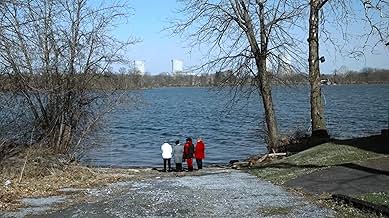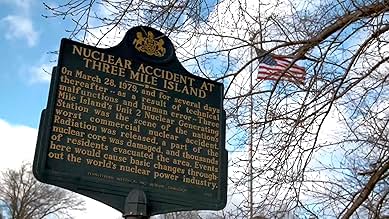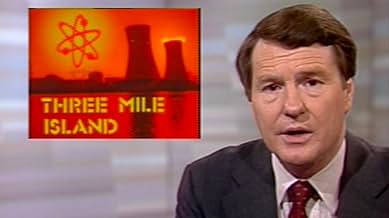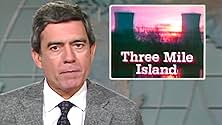Ajouter une intrigue dans votre langueA feminist feature documentary about the 1979 Three Mile Island meltdown with never-before-told stories.A feminist feature documentary about the 1979 Three Mile Island meltdown with never-before-told stories.A feminist feature documentary about the 1979 Three Mile Island meltdown with never-before-told stories.
Joanne Doroshow
- Self - Represented Three Mile Island Alert Community Group
- (as Joanne Doroshow - Attorney)
Lynne Bernabei
- Self - Represented Three Mile Island Alert Community Group
- (as Lynne Bernabei - Attorney)
Jack Herbein
- Self - Vice President, Metropolitan Edison
- (archive footage)
- (as John Herbein)
Avis en vedette
This film has been shown at two festivals so far, one in NYC, one in DC. I attended both, and in both it received standing ovations from the audience. Meticulous in reporting the science and the facts, it does an even better job capturing the emotional tension of four mothers taking on the federal government and corrupt corporations that were pushing the fake narrative that there was "nothing to see here" at Three Mile Island.
Calling the corporation "corrupt" is no exagerration, since court cases the women brought proved a pattern of falsifying documents, cheating on licensing exams, and lying to regulators.
Those government regulators also continue to lie to the public about the radiation released at TMI and the health effects on the downwinders, again as documented in the movie.
Anyone who is thinking about drinking the radioactive kool-aid the Biden administration is offering in the form of tax payer support for the nuclear industry needs to watch this movie and learn about its decades of lying and cover ups and cheer at the bravery of the women who exposed it.
Calling the corporation "corrupt" is no exagerration, since court cases the women brought proved a pattern of falsifying documents, cheating on licensing exams, and lying to regulators.
Those government regulators also continue to lie to the public about the radiation released at TMI and the health effects on the downwinders, again as documented in the movie.
Anyone who is thinking about drinking the radioactive kool-aid the Biden administration is offering in the form of tax payer support for the nuclear industry needs to watch this movie and learn about its decades of lying and cover ups and cheer at the bravery of the women who exposed it.
This movie tells the story of the women who fought back against the official response to the disaster at Three Mile Island. Focusing primarily on the efforts of four women who led the local community's protest, and a fresh-out-of-law-school lawyer who took a lawsuit all the way to the Supreme Court, it is both an indictment of the nuclear industry and its regulators and a personal story about real people.
I saw this at a local film festival and was expecting an amateur production or agitprop. But it's anything but. Rather, it is expertly filmed and carefully edited, splicing slice-of-life portraits, interviews with experts, and historical footage. It makes a compelling case that not only was the leak at Three Mile Island a cover-up that led to drastic spikes in cancer rates upwind of the site, but also that the official response to the leak was a travesty of justice against, and a personal tragedy for, the victims of the accident.
But what makes this film so compelling is how human it is. I found myself pulled into the lives of the people in this community, saddened at their tragedy, rooting for them as underdogs, and uplifted by their dogged spirit. The audience around me was rapt, sometimes in tears, and standing in applause at the end.
I saw this at a local film festival and was expecting an amateur production or agitprop. But it's anything but. Rather, it is expertly filmed and carefully edited, splicing slice-of-life portraits, interviews with experts, and historical footage. It makes a compelling case that not only was the leak at Three Mile Island a cover-up that led to drastic spikes in cancer rates upwind of the site, but also that the official response to the leak was a travesty of justice against, and a personal tragedy for, the victims of the accident.
But what makes this film so compelling is how human it is. I found myself pulled into the lives of the people in this community, saddened at their tragedy, rooting for them as underdogs, and uplifted by their dogged spirit. The audience around me was rapt, sometimes in tears, and standing in applause at the end.
Given the blatantly self-serving attempts at spin, unrepentant obfuscation and outright lying that we see so much of these days coming from officialdom, big business and the media, it's no wonder that so many of us have become fed up with such brazenly untruthful tactics. And that's not just activists and advocates saying this - it's a growing sentiment from everyday citizens who've tired of the practice of unbridled deliberate deception. Such actions may have been harder to spot years ago, but, when life-threatening circumstances are on the line, it's inspiring to see how quickly and fervently riled-up individuals can get. That was the case with what happened in the wake of the 1979 Three Mile Island nuclear accident, when it became obvious that falsely reassuring messages about the allegedly trivial nature of the incident began to become apparent to the Pennsylvania locals who resided in the danger zone and suffered the consequences that came from it. A groundswell of protests spearheaded by four courageous women and their ardent attorneys emerged, even if those efforts did not receive much attention at the time. However, this debut documentary feature from writer-director Heidi Hutner, a professor of sustainability studies at Stony Brook University, seeks to change all that by bringing the stories of these determined advocates to light - as well as making known just how serious this downplayed incident really was. Through a series of interviews with the movement's principals, as well as a wealth of archive footage from the time, audiences witness what these individuals went through personally and as leaders of a campaign where they met pervasive resistance, condescending gender discrimination and ongoing intimidation from corporate and government sources. This offering also features first-time interviews with an insider/whistleblower who worked at the plant and with actress/social activist Jane Fonda, whose film "The China Syndrome" (1979), a fictional depiction of a nuclear power plant disaster, ironically premiered only two weeks before this real world event unfolded. Hutner's release, which has now become available for streaming, on home media and at special screenings, presents a powerful, damning indictment of how ineptly this incident was handled and a heroic profile of the outspoken champions who were willing to go all-out, despite the obstacles, to make their case known. Even if they didn't garner the attention they deserved at the time, this film helps to make up for that, shining a bright light on the reckless carelessness of those willing to place their own interests ahead of the welfare of innocent victims - and how those victims fought back to make their voices heard.
This film fills a critical void in the coverage of Three Mile Island. While it is tempting to let TMI fade into the past, the impact it had on nearby residents continues to this day. Hutner has done a masterful job of telling the stories of these women and integrating it with the science that suggests that harms to health might have been greater than understood at the time. That combination, the stories of the victims together with cutting edge science is not so easy to get right and she has done it masterfully. While current research continues and the full answers are not yet known, it is appropriate to take stock and consider the risks of nulcear power even as some are promoting it as an alternative to fossil fuel combustion.
A never-before-told story about the women who fought the Nuclear Industry and their BIG LIE. They could have been warned but instead were kept in the dark, even after the Three Mile Island disaster occurred - putting their lives and their children's lives at risk. But they didn't slink away into darkness. They took on Goliath.
The film's director clearly built close relationship with the women who opened their homes to her, and she then interviews experts in the field to fill out the story. Cancer rates in that area are through the roof, and the suffering is horrific. And all of that could have been avoided if our government and big business believed in transparency.
The film's director clearly built close relationship with the women who opened their homes to her, and she then interviews experts in the field to fill out the story. Cancer rates in that area are through the roof, and the suffering is horrific. And all of that could have been avoided if our government and big business believed in transparency.
Meilleurs choix
Connectez-vous pour évaluer et surveiller les recommandations personnalisées
Détails
- Durée1 heure 16 minutes
- Couleur
Contribuer à cette page
Suggérer une modification ou ajouter du contenu manquant


































